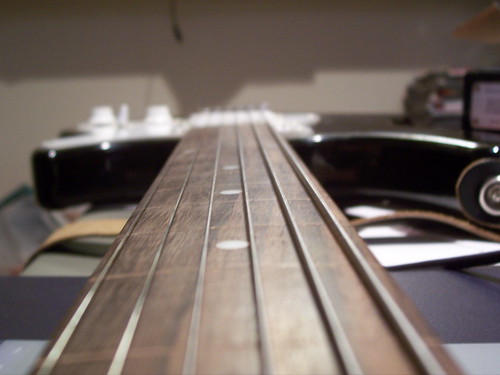 |
| Photo by alikins |
A fretless guitar is one that lacks frets completely. Its strings run from the guitar's bridge to its headstock. The instrument is played in the same manner as a fretted version. Because this guitar is, in a manner, less structured than its fretted cousins, it is capable of a wider variety of music. Most guitars are confined to 12-tone scales, but some musicians prefer fretless guitars because they allow for more tonal experimentation.
Fretless guitars also produce a different sound from their fretted cousins. The strings of a fretless guitar are only ever depressed between the player's fingertips and the soundboard. Such a technique absorbs the energy from the string's vibration faster than would occur if a fret were used. As a result, the strings of the fretless guitar have a more "damped" sound.
Without the frets to create a barrier between the strings and the fingerboard, fretless guitars can sometimes suffer from additional fingerboard wear. In an effort to counteract this problem, the fingerboard of a fretless guitar, especially a bass guitar, is usually made of a hardwood, such as ebony. Another solution is to apply a coat of epoxy to the strings or to use a type of string, such as flat-wound, that will reduce fingerboard wear.
Some artists criticize fretless guitars on several counts. For one thing, these instruments are much more difficult to play than typical guitars. The lack of frets leaves more room for error in hand positioning. As a result, more listening training is required of a fretless guitarist in order that he may be able to discern the minute differences in intonation that his instrument permits. Another common complaint is the fact that acoustic fretless guitars are simply softer than those with frets. On bass guitars, this problem is at least partially solved by the instrument's strings. Bass guitars use much heavier strings and have a heavier body overall, which creates a naturally louder sound. The issue, of course, can be solved on non-bass guitars via the use of pickups and amplification.
Although fretless guitars are not the norm, they have gained a certain number of followers, especially among electric bass guitarists. The use of these guitars is particularly common in jazz, funk, and R&B, probably due to the fact that the sound of a fretless guitar is similar to that of a double bass. Famous fretless bass guitarists include Bill Wyman (formerly) of The Rolling Stones, John Paul Jones of Led Zeppelin and the incomparable Sting of The Police.
|
